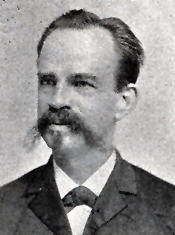Henry R. Gibson
| Henry Richard Gibson | |
|---|---|
 |
|
| Member of the U.S. House of Representatives from Tennessee's 2nd district |
|
|
In office March 4, 1895 – March 3, 1905 |
|
| Preceded by | John Chiles Houk |
| Succeeded by | Nathan W. Hale |
| Member of the Tennessee House of Representatives | |
|
In office 1875-1877 |
|
| Member of the Tennessee Senate | |
|
In office 1871-1873 |
|
| Personal details | |
| Born |
December 24, 1837 Kent Island, Maryland |
| Died |
May 25, 1938 (aged 100) Washington, D.C. |
| Citizenship |
|
| Political party | Republican |
| Spouse(s) | Frances (Reed) Gibson (m. 1863–1919, her death) Lizzie (Beckerdite) Clark (m. 1920) |
| Relations | Charles Hopper Gibson (cousin) |
| Children | 2 |
| Alma mater |
Hobart College Albany Law School |
| Profession | Attorney, newspaper editor, author |
Henry Richard Gibson (December 24, 1837 – May 25, 1938) was an American attorney and politician who represented Tennessee's 2nd district in the U.S. House of Representatives from 1895 to 1905. He also served as a state chancery court judge, and was a delegate to Tennessee's 1870 constitutional convention. Outside politics he wrote and edited several books on federal and state law.
Gibson was born on Kent Island, Maryland, in Queen Anne's County, son of Woolman and Catherine (Carter) Gibson. He attended the common schools at Kent Island and at Bladensburg, Maryland. He graduated from Decker's Academy at Bladensburg in 1858 and from Hobart College at Geneva, New York, in 1862.
Gibson served in the commissary department of the Union Army from March 1863 to July 1865. He entered Albany Law School in New York in September 1865. He was admitted to the bar in December 1865 and commenced practice in Knoxville, Tennessee, in January 1866. He moved to Jacksboro, Tennessee, in Campbell County in October 1866, and was appointed commissioner of claims by Governor William G. Brownlow in 1868. He eventually formed a law partnership with Leonidas C. Houk.
In 1870, Gibson represented Anderson and Campbell counties at the state convention which created the present Tennessee State Constitution. He served on the convention's legislative committee. At the convention, he proposed a resolution calling on the state to ratify the 15th Amendment to the U.S. Constitution, but the resolution failed (Tennessee wouldn't ratify the amendment until 1997). He also presented a memorial calling for the creation of Loudon County.
...
Wikipedia
